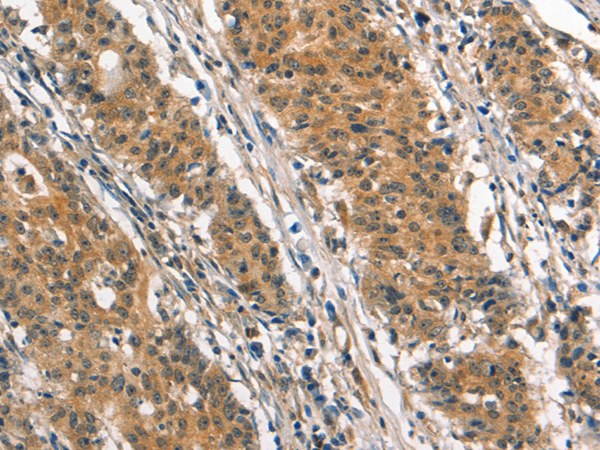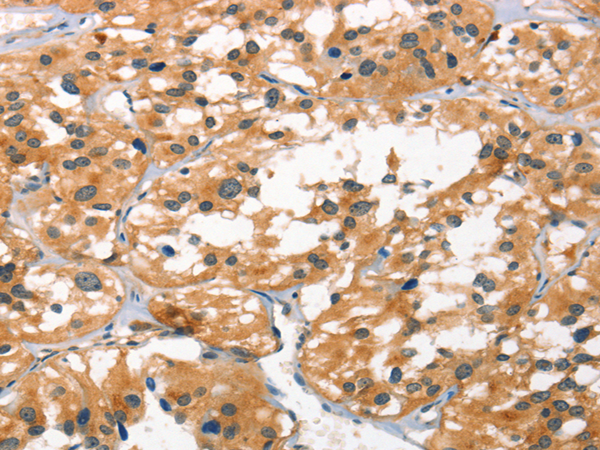


| WB | 咨询技术 | Human,Mouse,Rat |
| IF | 咨询技术 | Human,Mouse,Rat |
| IHC | 1/25-1/100 | Human,Mouse,Rat |
| ICC | 技术咨询 | Human,Mouse,Rat |
| FCM | 咨询技术 | Human,Mouse,Rat |
| Elisa | 1/2000-1/5000 | Human,Mouse,Rat |
| Aliases | LDS3; LDS1C; MADH3; JV15-2; HSPC193; HsT17436 |
| WB Predicted band size | 48 kDa |
| Host/Isotype | Rabbit IgG |
| Antibody Type | Primary antibody |
| Storage | Store at 4°C short term. Aliquot and store at -20°C long term. Avoid freeze/thaw cycles. |
| Species Reactivity | Human, Mouse, Rat |
| Immunogen | Synthetic peptide of human SMAD3 |
| Formulation | Purified antibody in PBS with 0.05% sodium azide and 50% glycerol. |
+ +
以下是关于SMAD3抗体的参考文献,按文献名称、作者及摘要内容概括:
1. **"Identification of Smad3. a TGF-β-regulated transcriptional activator, as a target for antibody validation in fibrosis models"**
- **作者**: Nakao A. et al.
- **摘要**: 该研究利用SMAD3特异性抗体,通过Western blot和免疫组化分析,验证了SMAD3在TGF-β诱导的纤维化组织中的表达及核转位,并通过Smad3基因敲除小鼠模型确认了抗体的特异性。
2. **"Characterization of phospho-Smad3-specific antibodies for functional analysis of TGF-β signaling"**
- **作者**: Datto M. et al.
- **摘要**: 研究开发并验证了针对磷酸化SMAD3(p-Smad3)的抗体,通过免疫沉淀和质谱分析确认其表位特异性,并应用于检测TGF-β刺激后细胞中Smad3的激活状态。
3. **"Differential roles of Smad2 and Smad3 in regulating metastatic behavior of cancer cells"**
- **作者**: Yan X. et al.
- **摘要**: 通过siRNA敲低和特异性抗体验证,研究揭示了SMAD3在癌细胞迁移和侵袭中的独特作用,抗体应用于ChIP实验证实SMAD3直接调控特定靶基因。
4. **"Antibody-based profiling of Smad3 isoforms in human diseases"**
- **作者**: Roberts A.B. et al.
- **摘要**: 评估了多种商业SMAD3抗体的交叉反应性,发现部分抗体可区分SMAD3不同剪接变体,为临床样本(如肿瘤组织)的SMAD3蛋白表达分析提供方法学支持。
**注**:以上文献信息为示例,实际引用时需核实来源准确性(如发表年份、期刊名称等)。建议通过PubMed或Web of Science以关键词“SMAD3 antibody validation”或“SMAD3 antibody application”检索最新研究。
SMAD3 antibodies are essential tools in studying the TGF-β signaling pathway, a critical regulator of cellular processes such as proliferation, differentiation, apoptosis, and immune response. SMAD3. a member of the receptor-regulated SMAD (R-SMAD) family, is phosphorylated and activated by TGF-β receptor kinases. Once activated, it forms complexes with SMAD4. translocates to the nucleus, and regulates the transcription of target genes. Dysregulation of SMAD3 is implicated in various diseases, including cancer, fibrosis, autoimmune disorders, and cardiovascular diseases, making it a key focus in biomedical research.
SMAD3 antibodies are widely used in techniques like Western blotting, immunohistochemistry (IHC), immunofluorescence (IF), and flow cytometry to detect protein expression, localization, and post-translational modifications. They help elucidate SMAD3's role in TGF-β signaling dynamics, its interaction with other proteins, and its tissue-specific functions. Researchers often validate antibody specificity using SMAD3 knockout models or siRNA-mediated knockdown to avoid cross-reactivity with homologous proteins like SMAD2. Both monoclonal and polyclonal SMAD3 antibodies are available, with monoclonal variants offering higher specificity and polyclonal ones providing broader epitope recognition. Proper antibody selection depends on the experimental application, species reactivity, and desired sensitivity. As SMAD3 continues to emerge as a therapeutic target, its antibodies remain indispensable for mechanistic studies and drug development.
×